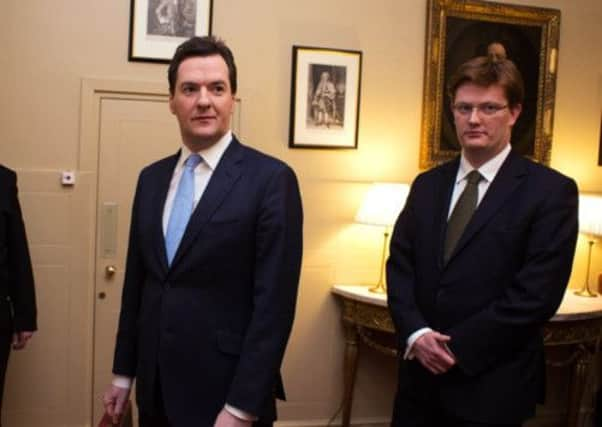Scottish independence: Split may cost families £2k


A Treasury paper launched by George Osborne tomorrow will highlight what it calls a “border effect” in the UK which, it claims, will boost Scotland’s economic performance by £5 billion over the next 30 years.
The claim centres around suggestions that independence would weaken trade, labour migration and other economic links between Scotland and the rest of the UK.
Advertisement
Hide AdAdvertisement
Hide AdDifferent regulations for business, a fragmented economy and the flow of trade between nations would all harm growth even without the existence of physical borders, the report says.
Scotland exported £36bn of goods and services to the rest of Britain in 2011, with imports of £49bn, the Treasury will say due to integrated markets. Exports from an independent Scotland to the UK could drop by 80 per cent over three decades, the Treasury will warn, even with free trade agreements.
Incomes in Scotland will rise by 4 per cent during the next 30 years, in an increase equivalent to £5bn, due to economic integration with the UK, it claims. The economic benefit, which the Treasury says equates to £2,000 per household in Scotland, would be at risk if Scots voted Yes in next year’s referendum.
Economic links between the United States and Canada are highlighted in the report with trade between the two nations 44 per cent lower than it could be due to their border.
Mr Osborne will unveil the Treasury paper during a visit to Aberdeen tomorrow.
The Treasury says that more than 40,000 people moved from Scotland to the rest of the UK in 2010-11, with a similar number going in the opposite direction.
The Treasury claims that the benefits of labour migration would be less under independence as it highlights the example of Germany and Austria, where it says the numbers are much lower due to the shared border.
The anti-independence Better Together campaign claimed the Treasury report showed that Scotland’s economy would be weaker in the event of a Yes vote.
Advertisement
Hide AdAdvertisement
Hide AdA Better Together spokesman said: “Being part of the UK allows Scottish businesses to thrive.”
However, Deputy First Minister Nicola Sturgeon attacked the Treasury claims as she insisted that the policies of Westminster governments had harmed the living standards of Scots.
She said: “A majority of people in Scotland want to see economic decisions taken in Scotland for Scotland – not by Westminster.”
Key claims made in Treasury paper:
• £5bn - The amount Scotland’s place in UK is worth to incomes (£2,000 per household) in Scotland over next 30 years.
• £36bn - Scotland exports to UK in 2011, imported £49bn from UK in 2011. 80 per cent lower after 30 years, in the event of independence.
• 44% - Trade between the US and Canada lower due to border between them.
• 44,000 people moved from Scotland to the rest of the UK in 2010-11, 41,000 moved from the rest of the UK to Scotland that year.
Free childcare for more low-income parents
Free childcare will be extended to double the number of two-year-olds in families on low incomes, the Deputy Prime Minister has said.
Advertisement
Hide AdAdvertisement
Hide AdThe government has promised to bolster the handout which will be offered to 40 per cent of parents with two-year-olds next year.
It will be available to 260,000 toddlers and families earning less than £16,190 per year who receive working tax credits.
Adopted children, those in care and youngsters with a disability, or special educational needs, will also benefit from the changes to be brought in next September, Nick Clegg said.
Some 130,000 two-year-olds are currently eligible for free childcare, based on whether their family qualifies for free school meals or is cared for by a local authority.
“From today, if you’re a parent on a low income with a two-year old in the family you’ll qualify for up to 15 hours a week of free early education for your child,” Mr Clegg said.
“And from this time next year, we will extend that helping hand even further, doubling the number of youngsters getting a brighter start in life.”
The government has invested £534 million this year in childcare for two-year-olds.
KATIE HODGE